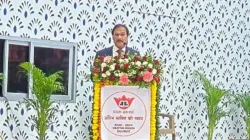Supreme Court judge warns against rising divisive rhetoric, stresses importance of fraternity
Justice Prashant Kumar Mishra emphasised the need to counter divisive rhetoric and promote fraternity as a cornerstone of India's unity and democracy.

Supreme Court Judge Justice Prashant Kumar Mishra on Saturday raised concerns about the growing use of divisive rhetoric based on religion, caste, and ethnicity, calling it a major challenge to the constitutional ideal of fraternity. Speaking at a national council meeting of the Akhil Bharatiya Adhivakta Parishad (ABAP) in Vadtal, Gujarat, Justice Mishra emphasised that such rhetoric undermines the sense of unity that the Indian Constitution envisions.
Justice Mishra warned that identity politics, often used by politicians to gain votes, deepens social divisions, leading to exclusion, discrimination, and conflict. He described fraternity as the unifying thread that binds the ideals of liberty, equality, and justice within India's democratic framework. Without fraternity, he said, these ideals remain fragile, like a tripod missing a crucial leg.
The judge further elaborated on the threats posed by divisive ideologies, economic inequality, and social injustice. These issues, he stated, weaken the spirit of brotherhood, which must be upheld by citizens, institutions, and leaders alike. Justice Mishra highlighted the damaging role of digital technology and social media in spreading hate speech, misinformation, and divisive content, further escalating social tensions and mistrust between communities.
"Divisive rhetoric creates mistrust, leading to stereotypes and misunderstandings," he warned. "When political leaders use social identities for electoral gains, it deepens divisions, making it harder to build a collective sense of belonging."
Justice Mishra called for collective efforts to address these challenges, urging every segment of society to actively participate in safeguarding fraternity. He stressed that the judiciary must play a proactive role in promoting unity through mediation, reconciliation, and crafting judgments that reflect fraternal values.
The judge concluded by advocating for a "multi-faceted approach" to promote fraternity, involving lawmakers, civil society, and responsible use of technology, to ensure that fraternity remains a cornerstone of India's democratic ethos.